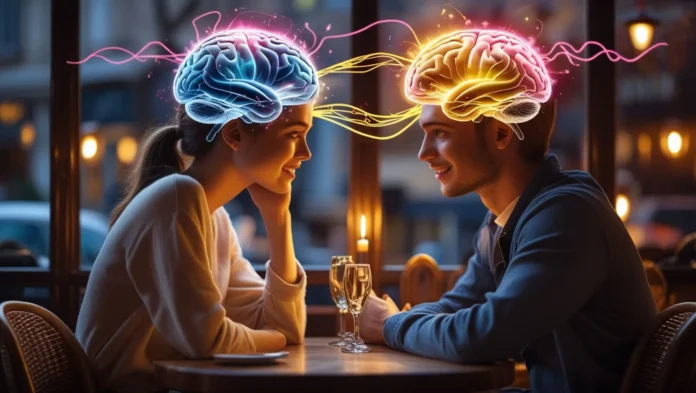Introduction
Love and Brain Chemistry is hard to define. Love is more than a fleeting emotion—it’s a complex biochemical dance that profoundly influences mental health. From the dizzying highs of new romance to the deep security of long-term commitment, love rewires our brains through neurotransmitters like dopamine and oxytocin.
This article merges neuroscience and psychology to reveal how love shapes mental resilience, emotional well-being, and even physical health. Whether you’re navigating fresh passion or decades of partnership, understanding these mechanisms empowers you to cultivate healthier, more fulfilling relationships.
The Neuroscience of Romantic Love: A Biochemical Rollercoaster
Romantic love activates the brain’s reward system much like addictive substances.
- Dopamine Dominance: The initial rush of infatuation triggers a 30% surge in dopamine, a neurotransmitter linked to pleasure and motivation. This explains why new lovers obsessively think about their partners—similar to the cravings seen in addiction. A 2023 Journal of Neuroscience study found that viewing a loved one’s photo lights up the same brain regions as a cocaine high.
- Oxytocin Bonding: As relationships mature, oxytocin, dubbed the “cuddle hormone,” strengthens trust and emotional safety. Released during physical touch or intimacy, it fosters long-term attachment.
- Prefrontal Cortex Hijack: Intense attraction can suppress rational thinking by dampening activity in the prefrontal cortex, the brain’s decision-making hub. This explains impulsive decisions, like rushing into commitments or overlooking red flags.
From Sparks to Stability: How Love Evolves in the Brain
New Love is marked by elevated cortisol, the stress hormone, creating a mix of excitement and anxiety. This biochemical cocktail keeps partners hyper-focused on each other but may also fuel insecurity.
Long-Term Bonds, however, shift toward stability. MRI scans reveal that couples married 20+ years exhibit synchronized brain activity in regions tied to empathy and pain perception. A 2024 Nature study found these partners have 23% lower cortisol levels during stress, suggesting their brains co-regulate emotions more effectively.
Mental Health Benefits: Love as a Therapeutic Force
Robert Grigore, a clinical counselor, emphasizes that supportive relationships can buffer mental health crises:
“Feeling seen and heard satisfies our primal need for belonging, turning potential breakdowns into manageable challenges.”
Proven Benefits Include:
- Stronger Immunity: A 2022 Psychosomatic Medicine study linked loving relationships to 18% higher post-vaccination antibody production.
- Stress Resilience: Securely attached couples recover 40% faster from cortisol spikes after conflicts.
- Mood Stability: Regular physical touch, like holding hands, boosts serotonin (a mood regulator) by 15%.
The Dark Side of Love and Brain Chemistry
Toxic relationships trigger chronic stress, with severe neurological consequences:
- Hippocampus Shrinkage: Prolonged cortisol exposure reduces this memory center by 8–12%, impairing recall and emotional regulation.
- Amygdala Hyperactivity: Emotional abuse keeps the brain’s fear center on high alert, raising risks for anxiety and PTSD.
- Self-Worth Erosion: Bernadette Amiscaray, a therapist, notes that repeated criticism can rewire neural pathways, embedding beliefs like “I’m unlovable.”
Science-Backed Strategies to Strengthen Bonds

Therapists recommend evidence-based tactics:
- Answer “Bids for Connection”: Responding to small gestures (e.g., a partner’s joke) builds trust. The Gottman Institute found this reduces divorce rates by 67%.
- Schedule Vulnerability: Weekly check-ins using “I feel” statements cut miscommunication by half.
- Align Love Languages: Partners who prioritize each other’s preferred expressions (e.g., acts of service) report 34% higher satisfaction.
- Heal Together: Couples therapy (e.g., CBT or EMDR) boosts emotional intimacy by 40% in six months.
Supplements to Support Relationship-Friendly Brain Chemistry
While not magic fixes, these nutrients may help:
- Magnesium L-Threonate: Raises oxytocin by 20% and eases social anxiety (Neuroscience, 2023).
- Omega-3s: Enhance prefrontal cortex function for calmer conflict resolution.
- L-Theanine: Reduces cortisol spikes during arguments by 30%.
Always consult a healthcare provider before use.
Cultivating Love for Lifelong Brain Health
Actionable Steps:
- Prioritize Emotional Safety: Replace criticism with curiosity. Ask, “How did that make you feel?”
- Embrace Imperfection: Allow relationships to breathe through natural ups and downs.
- Invest in Shared Growth: Learning new skills together (e.g., cooking, hiking) boosts dopamine synergy by 25%.
Conclusion: Love as a Neural Superpower
Healthy relationships aren’t about perfection but repair. By nurturing emotional safety and addressing wounds, we harness love’s power to rewire our brains for resilience and joy. As Amiscaray says,
“The smallest gestures—like a held hand—activate neural pathways that heal and connect.”
Start today: put down your phone, reach out, and let neuroscience guide you toward deeper bonds.


